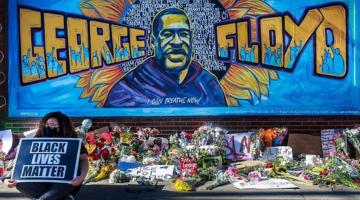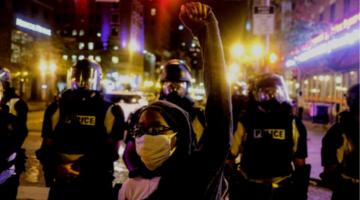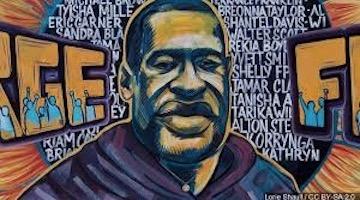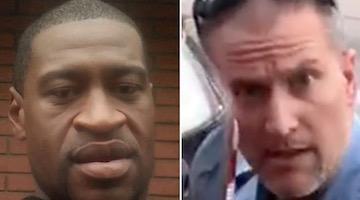American policing is defended as good despite its unmatched amounts of lethal violence.
“Within their cloud of fear, they have come to believe that police violence is caused by a lack of compliance, rather than seeing it as the violent son of American slavery.”
Chicago Police Officer Eric E. Stillman chased a boy down an alleyway.
It was the early morning of March 29. In Minnesota, opening statements in the Derek Chauvin trial were coming in a few hours. Stillman had responded to reports of gunshots in Little Village, a predominantly Latino community on Chicago’s West Side.
“Stop right now!” the officer yelled at Adam Toledo, a 13-year-old seventh grader at Gary Elementary School. “Hands. Show me your hands. Drop it. Drop it.”
A video taken by Stillman’s body camera shows Toledo apparently complying.
He appears to drop something.
He stops.
He turns around.
He shows his hands.
Stillman fires a single shot, killing Toledo.
Afterward, Stillman’s attorney insisted that the fatal shooting was justified. “The police officer was put in this split-second situation where he has to make a decision,” said Timothy Grace, a lawyer retained by the Fraternal Order of Police in Chicago.
But it was Stillman who put Toledo in a split-second situation where he had to make a decision. Toledo decided to do everything the officer asked him to. He complied, but he is not alive today.
For Black and brown people, this is the terror of American policing. When we do not comply, we die like Daunte Wright did. When we do comply, we die like Adam Toledo did.
“Toledo complied, but he is not alive today.”
Compliance will not save our lives. Compliance will not save us from being brutalized and debased like U.S. Army Second Lieutenant Caron Nazario was in Virginia. Even when we are forced into a compliant position—handcuffed and prone and kneed like George Floyd was, incarcerated like Sandra Bland was—we may end up dead.
Black and brown people are told in endless ways by fraternal orders of police and their powerful enablers: Comply and survive. The defense attorney for Chauvin has said this in countless ways during Chauvin’s trial, and will likely say it again during his closing statement today: Floyd would have survived if he had complied.
“Daunte Wright, if he would have just complied. He was told he was under arrest,” said Brian Peters, the executive director of Minnesota’s largest police union. “He set off a chain of events that unfortunately led to his death.”
After Nazario was hurt during a traffic stop, Windsor Police Chief R. D. Riddle said, “At the end of the day, I’m glad nobody got hurt. That situation ended in the best way it could have. I wish he would have complied a whole lot earlier.”
A piece in Mississippi’s Natchez Democrat over the summer declared: “Don’t defund the police; retrain the people to comply.” In 2019, the Houston Police Officers’ Union circulated the slogan “Comply Don’t Die. Live to Have Your Day in Court.”
That is an old sentiment. A century ago, the Ku Klux Klan and its powerful enablers delivered a similar message to Black and brown people.
In 1925, Louise Little was expecting to deliver at any moment, when hooded horsemen carrying flickering torches rode up to her wood-frame farmhouse outside Omaha, Nebraska. The Little family had moved to a segregated white neighborhood from the overcrowded strip of blocks allotted to Black people—and Louise and her husband, Earl, had been audaciously organizing for Marcus Garvey’s Universal Negro Improvement Association.
“Get that nigger out here, now!” one Klansman shouted, Les and Tamara Payne recount in The Dead Are Arising.
With Earl out of town preaching, an intrepid Louise came outside and faced the armed men. “The Klansmen shouted threats and warnings at her that we had better get out of town because ‘the good Christian white people’ were not going to stand for my father’s ‘spreading trouble’ among the ‘good’ Negroes of Omaha,” Malcolm X wrote on the first page of his autobiography. After Malcolm was born, on May 19, the Little family complied and left Omaha. Three months later, more than 30,000 northern Klansmen paraded down Pennsylvania Avenue in Washington, D.C.
“A piece in th Natchez Democrat declared: ‘Don’t defund the police; retrain the people to comply.’”
Two centuries ago, enslaved people from the Southwest to the Southeast were given the same message by slaveholders and their powerful enablers. “There should be a perfect understanding between the master and his slave,” one South Carolina enslaver said in 1833. “The slave should know that his master is to govern absolutely, and he is to obey implicitly. That he is never for a moment to exercise his will or judgement in opposition to a positive order.” As early as 1696, the Boston minister and enslaver Cotton Mather instructed enslaved Black people to “be orderly in every thing” and “all your pains will End in Everlasting Joyes,” as he wrote in A Good Master Well Served. “But if you will not be such Orderly Servants,” then “all the Sorrows that you see in this World, are but the Beginnings of Sorrows.”
Enslaved people were habitually told to remember (and obey) the “good” masters. Violently policed people today are constantly told to remember (and obey) the good cops, as a writer in Forbes urged after Floyd’s death last year. “The vast majority of law-enforcement officers are heroes,” Senator Mitch McConnell said in September. Weeks later, the then–presidential candidate Joe Biden said, “I have worked with police in this country for many years. I know most cops are good, decent people. I know how they risk their lives every time they put that shield on.”
Police officers do risk their lives. But do I risk my life every time I pull over for an armed police officer? When I don’t have my documents in my hand on the steering wheel and I comply and reach for them, an officer can shoot me dead like one did Philando Castile. Compliance is not a lifesaver. When I comply completely, like Toledo did, I feel lucky to survive police encounters.
There are good cops. Some of these good cops are related to me and loved by me. Some of these good cops are not related to me and let people like me live when we defy or comply.
But the question is not how many good or bad cops exist today. The questions we should be asking are: What are police officers empowered to do to me by policies and practices? Why are they given military training, weaponry, and near-total impunity? Have racist narratives trained them to fear my dark body?
These questions are not about any individual cop. These questions are not individual. These questions are institutional. The question is whether the institution of American policing is good.
“What are police officers empowered to do to me by policies and practices?”
The violent institution of American slavery—the concentrated patrolling of enslaved bodies on and off plantations—is an ancestor of the violent institution of American policing. And like its forebear, American policing is defended as good despite its unmatched amounts of lethal violence.
American police have killed more than 6,000 people since 2015. American police kill civilians at a much higher rate than law-enforcement officers in every other wealthy country do. American police kill 33.5 people out of every 10 million, which is more than three times the second-highest national rate: Canada’s, at 9.8 out of every 10 million. In the United States, Black people are killed by the police at more than twice the rate of white people. Police are the sixth leading cause of death for young Black men, after cancer. More people die in police custody in the United States than in any other wealthy country. That’s 12 deaths for every 100,000 arrests in the U.S., which is more than twice the second-highest national rate: Australia’s, at five deaths per 100,000 arrests. Nearly a quarter of the people killed by police since 2015 had a mental illness. According to a Washington Post database, white Americans accounted for 59 percent of those with a mental illness who were killed, Black Americans 16 percent, and Latino Americans 13 percent.
All of this police violence has hardly made the United States one of the safest countries in the world, or even close to the safest. The U.S. is in the middle of the global pack of nations on crime and homicide rates; several nations in Africa and Latin America have both far less police and far less crime. According to a recent Washington Post analysis, the overall arrest rate for homicide cases in the nation’s 50 largest cities is a mere 49 percent, and about two-thirds of those cities had a lower homicide-arrest rate in 2018 than in 2008. “Some cities, such as Baltimore and Chicago, solve so few homicides that vast areas stretching for miles experience hundreds of homicides with virtually no arrests,” the Post reporters found.
“American police kill civilians at a much higher rate than law-enforcement officers in every other wealthy country do.”
Despite being in the middle of the pack on crime statistics, despite not solving most homicides, despite having the highest rates of violence in the wealthy world, the U.S. still rewards its police. American state and local governments collectively spend nearly $118.8 billion on policing, according to the Speaking Security newsletter. Only the United States ($731.8 billion) and China ($261.1 billion) spend more on their militaries than the United States spends on its police forces. Deciding not to defund, disarm, and draw down the police is an extremist, wasteful, violent, and anti-American position.
Then again, the racist fear of the dangerous dark body governs—as it has since the days of slavery. As divided as many conservatives, moderates, and liberals are on other matters, they remain largely united by their fear of roaming dark bodies, and vulnerable to fearmongering by police officials, or by former President Donald Trump when he says, “Without police, there is chaos.”
The American people can’t see all the chaos that police cause: the police violence, the nonviolent and violent demonstrations against police violence, the police violence at the police-violence demonstrations. This is what the historian Elizabeth Hinton deftly documents and calls “the cycle” in her forthcoming book, America on Fire.
Centrists, liberals, and many progressives decried the building of Trump’s border wall to keep out the “animals,” “criminals,” and “rapists” from “shithole” countries. But then, in their hypocrisy, many decried calls to remove the wall of American policing that they believe protects them from the animals and super-predators and rapists of color. Within their cloud of fear, they have come to believe that armed forces, powerful prosecutors, and prison cells somehow prevent and control violent crime better than providing jobs, resources, and opportunities to people who have been deprived of them. Within their cloud of fear, they have come to believe that police violence is caused by a lack of compliance, rather than seeing it as the violent son of American slavery.
When will the American people realize what cellphone videos keep showing them, what body cameras keep recording, what the graveyards of history keep reporting? Black and brown people’s defiance is not the problem. Our compliance is not the solution.
Police defiance of our humanity is the problem. American defiance of our right to live is the problem. Political compliance—to abolish American policing as we know it—is the solution.
Police compliance with our humanity could be the solution, but I can’t imagine the institution of American policing ever recognizing Breonna Taylor’s human rights, Eric Garner’s cries to breathe, or the life that a Latino seventh grader has to live. The institution of American policing has never systematically complied with my humanity, and it never will. To believe otherwise is to comply with an alternative history, with a fantasyland, with wishful thinking, with an American dream that is my American nightmare.
IBRAM X. KENDI is a contributing writer at The Atlantic and the Andrew W. Mellon Professor in the Humanities and the director of the Boston University Center for Antiracist Research. He is the author of several books, including the National Book Award–winning Stamped From the Beginning: The Definitive History of Racist Ideas in America and How to Be an Antiracist.
This article previously appeared in The Atlantic and Portside.
COMMENTS?
Please join the conversation on Black Agenda Report's Facebook page at http://facebook.com/blackagendareport
Or, you can comment by emailing us at comments@blackagendareport.com













